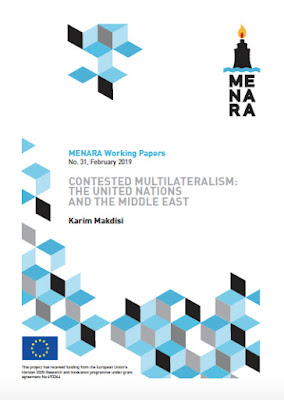In the Middle East, multilateralism has often been associated with intervention and creating order (or disorder), rather than being a positive force for integrating the region in an equitable manner. Many of the regional struggles and their attendant multilateral implications that have taken place have played out in international institutions, and particularly in the United Nations, through its resolutions, agencies and emissaries, writes KARIM MAKDISI.
In a working paper published as part of the Middle East and North Africa Regional Architecture project, he explores how conflicts in the MENA region are dealt with within the context of this (contested) multilateralism, focusing on the UN as its main institutional embodiment and as a site of competing claims of legitimacy.
In the paper, titled 'Contested Multilateralism: the United Nations and the Middle East', MAKDISI uses concepts from critical realism and constructivism, and claims that the Middle East is a central site in which both the world order and many of the UN institutions have been produced or contested.
The author, Associate Professor of International Politics in the Department of Political Studies and Public Administration at the American University of Beirut, first sets out the context for multilateralism and world order, and explores how this has played out in the Middle East through the UN during the main phases of contemporary international order, from the Cold War to the immediate post-Cold War period, to the war on terror and beyond.
He concludes by briefly evaluating the UN during the Arab uprisings, arguing that the organization’s ambivalence reflects an evolving and contested multilateralism.
“The Arab uprisings that began in 2010 reflect the ambivalence of multilateralism,” MAKDISI contends. During these early days, the UN dispatched high-ranking diplomats to mediate the conflicts in Libya and Yemen and provided technical assistance in the Tunisian and Egyptian-led elections processes.
Even the explicit use of the R2P principle in the Security Council resolution justifying military intervention in Libya – for the protection of civilians – was unanimously passed and promptly celebrated in UN circles as the dawn of a new era in which violent state clampdowns on their own citizens would no longer be tolerated and international norms would prevail.
These sorts of intervention, popular locally and supported by consensus among the key UN member states, were very much in line with the UN’s wider peacebuilding mandate in the post-Cold War paradigm of the liberal peace. Before long, however, during the Arab uprisings the UN was thrust into increasingly uncomfortable positions and the spotlight as the violent counter-attack began in the region. Its role in the global liberal peace project depended on international consensus, and this was quickly dissipating – as it did during the 2003 US war on Iraq – as regional actors competed to fill the void and direct this regional transformation. In particular, Libya, Yemen and Syria witnessed humanitarian tragedies, unprecedented displacement crises and high-profile diplomatic failures. “In each of these instances, the UN was increasingly disparaged, at best, or accused of complicity.”
The harsh criticism of the UN’s response in the Syrian war, and its failures in Libya and Yemen (not to mention its silence in places such as Bahrain), are certainly valid. But the UN has all too often been used a convenient punch bag, masking the moral and political failures of key regional and international players. As with the other phases of international politics outlined above, at its most basic level the UN and the multilateral context within which it operates is a reflection of great power politics.
The Middle East is a central site in which both world order and many UN institutions have been created or contested. "Overall, the uncertain and ambivalent role of the UN during the Arab uprisings reflects a world order in transition. It is caught between maintaining an old order that it is familiar with – mediating, working with sovereign states to find political solutions, creating space for humanitarians to work in and assisting the liberalizing process – and an emerging order in which US power is in decline, a more 'multiplex' order is emerging, and non-state players increasingly challenge the notion of sovereignty.
During such turbulence, the default position for UN machinery is working towards maintaining order and stability rather than promoting genuine transformation. “Such a view makes it easier to understand – if not to accept – why [then UN Under-Secretary-General for Political Affairs, B. Lynn] Pascoe’s remarks about the UN siding with the 'people' during the uprisings was merely aspirational,” the author states.
Subscribe to:
Post Comments (Atom)
The United Nations and the Protection of Civilians: Sustaining the Momentum
The protection of civilians (PoC) concept remains contested twenty-three years after the first PoC mandate. Current PoC frameworks used by ...

-
Beijing and Moscow both have exerted significant influence on the evolution of the concept of ‘Responsibility to Protect’ (R2P), which has...
-
Although member states have debated reform of the United Nations Security Council (UNSC) since the organization’s inception, little attent...
-
Despite being recognized across the international community as one of the critical development challenges of our time, a uniform definitio...




No comments:
Post a Comment